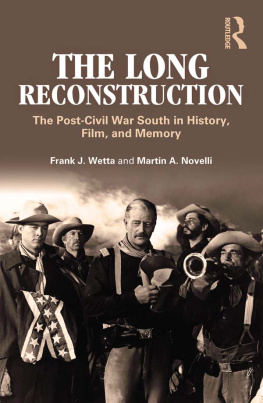
Last Stands from the Alamo to Benghazi
Last Stands from the Alamo to Benghazi examines how filmmakers teach Americans about the countrys military past. Examining twenty-three representative war films and locating them in their cultural and military landscape, the authors argue that Hollywoods view of American military history has evolved in two phases. The first phase, extending from the very beginnings of filmmaking to the Korean War, projected an essential patriotic triumphalism. The second phase, from the Korean and Vietnam Wars to the present, reflects a retreat from consensus and reflexive patriotism. In describing these phases, the authors address recurring themes such as the experience of war and combat, the image of the American war hero, race, gender, national myths, and more. With helpful film commentaries that extend the discussion through popular movie narratives, this book is essential for anyone interested in American military and film history.
Frank J. Wetta is Lecturer, Department of History and Senior Fellow, Center for History, Politics, and Policy, Kean University. He is co-author of The Long Reconstruction: The Post-Civil War South in History, Film, and Memory (2014).
Martin A. Novelli teaches film and history at the University of the Arts, Philadelphia, and at Kean University. He is co-author of The Long Reconstruction: The Post-Civil War South in History, Film, and Memory (2014).
Last Stands from the Alamo to Benghazi
How Hollywood Turns Military Defeats into Moral Victories
Frank J. Wetta and Martin A. Novelli
First published 2017
by Routledge
711 Third Avenue, New York, NY 10017
and by Routledge
2 Park Square, Milton Park, Abingdon, Oxon OX14 4RN
Routledge is an imprint of the Taylor & Francis Group, an informa business
2017 Taylor & Francis
The right of the authors to be identified as authors of this work has been asserted by them in accordance with sections 77 and 78 of the Copyright, Designs and Patents Act 1988.
All rights reserved. No part of this book may be reprinted or reproduced or utilized in any form or by any electronic, mechanical, or other means, now known or hereafter invented, including photocopying and recording, or in any information storage or retrieval system, without permission in writing from the publishers.
Trademark notice : Product or corporate names may be trademarks or registered trademarks, and are used only for identification and explanation without intent to infringe.
Library of Congress Cataloging in Publication Data
A catalog record for this book has been requested.
ISBN: 978-1-138-81955-9 (hbk)
ISBN: 978-1-138-81956-6 (pbk)
ISBN: 978-1-315-74437-7 (ebk)
Typeset in Bembo
by Apex CoVantage, LLC
For Lieutenant Colonel Andrew Brent Decker (United States Army, retired)
Frank J. Wetta
For Lisa, Max, Jake, and Lawrence
Martin A. Novelli
Thanks to Roger J. Spiller, the George C. Marshall Distinguished Professor of Military History (emeritus), and Joseph G. Dawson, III, Professor of History, Texas A&M University.
"The Very Thought of Losing"
Come on, suckers! Whats the matter with you? What are you waitin for? Didnt think we were here, did you? You dirty rotten rats! Were still here! Well always be here! Why dont you come and get it?
(Sgt. Dane (Robert Taylor), laughing hysterically and calling out to the Japs, Bataan , 1943)
Americans play to win all the time. I wouldnt give a hoot in hell for a man who lost and laughed. Thats why Americans have never lost, and will never lose a war... because the very thought of losing is hateful to Americans.
(General Patton (George C. Scott), addressing his troops, Patton , 1970)
It is the most famous last stand in historythe Gates of Fire, Thermopylae pass, late summer 480 BCE. The ancient Greek historian, Herodotus, the father of history, records the final moments of the Spartan fight against the Persian hordes: The Hellenes knew they were about to face death... and so they exerted their utmost strength against the barbarians, with reckless desperation and no regard for their own lives... And it was during this struggle that Leonidas fell... and with him those other famous Spartans. Their memorial inscription reads:
Go tell the Spartans, stranger passing by
that here, obedient to their laws, we lie.
Thermopylae has had a strong hold on Western thought about war and sacrifice and on Hollywoods imagination as well. For Americans, desperate actions at the Alamo, along the Little Big Horn River, on Wake Island, the Bataan Peninsula, and at Corregidor; in the Central Highlands of Vietnam; on the streets of Mogadishu; in the Hindu Kush of Afghanistan; and at the American compounds in Benghazi have provided filmmakers with rich material to project and interpret in a variety of ways the American military experience.
Americans love winning but losing has its virtuesa test of courage against the odds, devotion to ones country, duty unto death, the defense of ones honor, faithfulness to ones comrades, and moral victory in place of triumph on the battlefield. Its not easy for many Americans to think deeply about battlefield disaster; American culture is a victory culture, historian and military strategist Dominic Tierney notes: Coded into the American DNA are the fear of failure and the celebration of winning. Americans tend to be comfortable with loss only when it proves a temporary setback on the road to ultimate triumph. The Alamo, Wake Island, and Bataan, for example, were interpreted as moral victories. By moral victories is meant military defeats or failures that were interpreted as victories in moral terms. Moral victories bestowed some meaning or nobility or honor on defeat. Soldiers did not die in vain. They died for the better cause. In other words, the enemy gained an actual victory; the Americans gained a moral victory.
In World War II, moral victories were seen as preludes to a real and final victory over the enemy. Today moral victory in that sense means less, carries much less power. That erosion began late in World War II, increased during the Korean War, and really began to take shape in Vietnam, where popular sentiment refused to see any chance of retrieving honor from American defeat. The last vestige of honor is now reduced to its bare minimum, that of sacrificing for ones comrades. How moviemakers have interpreted this moral drama and its evolution over time and in the context of the times is the principal aim of this book. If actions in Korea, Vietnam, Iraq, Somalia, and Afghanistan were not militarily successful, what kind of moral victories could be wonif any?
From 1898 to 1945 America was on a winning streakthe Spanish-American War, World War I and World War IIbut Korea ended in a stalemate, Vietnam with a humiliating retreat. Events in the Middle East frustrated an American military force that is, by conventional standards, the best in the worldperhaps the best trained, best equipped, and best motivated military force in history. To compensate for strategic misjudgment, unsatisfactory progress and near disasters, stories of individual courage and loyalty to ones comrades served as compensationproviding discrete moral victories in an age of unwinnable conflicts.






